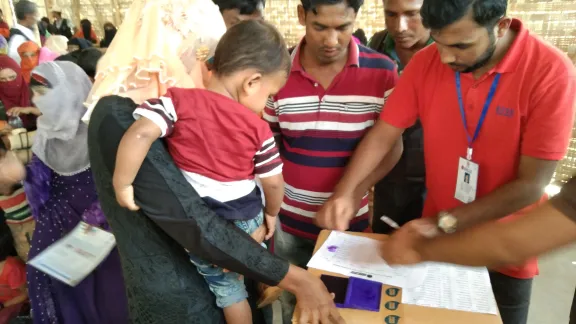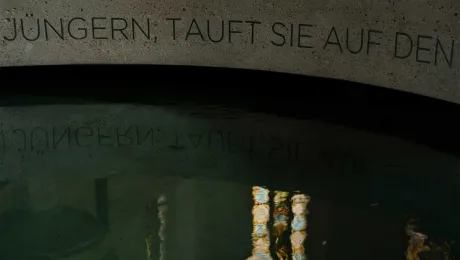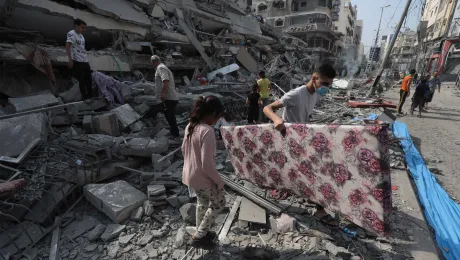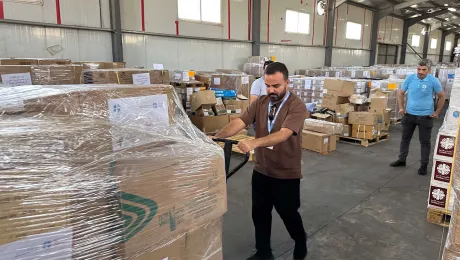
Rohingya refugees in Coxâs Bazaar IDP camp receive a distribution of WASH kits by LWF's local partner. Photo: LWF/ B. Khanal
LWF speaks at Canadian Parliament on human rights in Rakhine State
(LWI) - “Humanitarian needs in Rakhine, Myanmar are a complex set of vulnerabilities arising from natural disasters, ethnic tensions, armed conflict, statelessness, institutionalised discrimination, and protracted displacement,” said David Mueller, LWF Country representative in Myanmar. “The situation is further compounded by chronic poverty, violence against women and the outbreak of the Covid-19 virus.”
Humanitarian needs in Rakhine, Myanmar are a complex set of vulnerabilities arising from natural disasters, ethnic tensions, armed conflict, statelessness, institutionalised discrimination, and protracted displacement.
1.3 million people in need
The Lutheran World Federation (LWF) provided a testimony on the status of human rights in Myanmar in front of the Canadian’s House of Commons’ Subcommittee on International Human Rights, which held a session focusing on of COVID-19 on displaced people from Myanmar in Bangladesh. The subcommittee of the Standing Committee on Foreign Affairs and International Development sometimes invites officials from non-government organizations to testify on matters related to human rights concerns.
At the moment around 700,000 Rohingya refugees in Bangladesh continue to wait for a safe return to their homeland. Around 600,000 Rohingya remain in Myanmar, including 130,000 confined to camps since 2012 in central Rakhine state. They are denied freedom of movement, equal access to citizenship and access to essential services, Mueller shared with the House of Commons. Their situation has grown worse due to the COVID-19 pandemic and public measures put in place to contain it.
“The significant movement restrictions, to reduce the further spread of COVID-19, have resulted into camp resident’s feeling less protected. They have made access to services, including access to education and livelihood support more challenging than before,” Mueller said.
Since 2008, LWF World Service supports the Rohingya and other displaced people in Rakhine, Chin and Ann State, with essential services like education and community’s development to promote peace and social cohesion. In Bangladesh, LWF, together with partners, supports Rohingya refugees in the Cox’s Bazaar refugee camp. In addition, through the UN Human Rights Council, LWF has on numerous occasions’ submitted reports and advocated for the rights of Rohingya and other marginalized groups in Myanmar.
Strategic partnerships and advocacy
The government of Canada supports LWF’s work in Myanmar through the collaboration with Canadian Lutheran World Relief (CLWR). The project of LWF and CLWR is reaching internally displaced Rohingya, their host communities and other marginalized people in eight camps and six host villages in Rakhine. The project focuses on improving basic needs like access to clean drinking water, relief goods, gender-sensitive shelter, dignity kits and COVID-19 prevention materials.
The project also empowers women and girls through leadership skills training and literacy classes to increase their participation in community based decision-making. It also engages with men and boys when setting up sessions on women’s rights.
In view of the forthcoming UN human rights Universal Periodic Review (UPR) for Myanmar, LWF called for leadership and support of the Canadian government to promote key human rights. Mueller underlined the importance of a reform of the citizenship law, freedom of movement for the Rohingya and other ethnic minorities, women’s rights, children’s right to education, rights of people living with disabilities, and housing, land and property rights.
“We need to seek durable solutions. This means, more integrated approaches that holistically address the human rights situation on the ground, humanitarian and development needs and inclusive peace perspectives, “ Mueller concluded.
LWF/ C. Kästner


